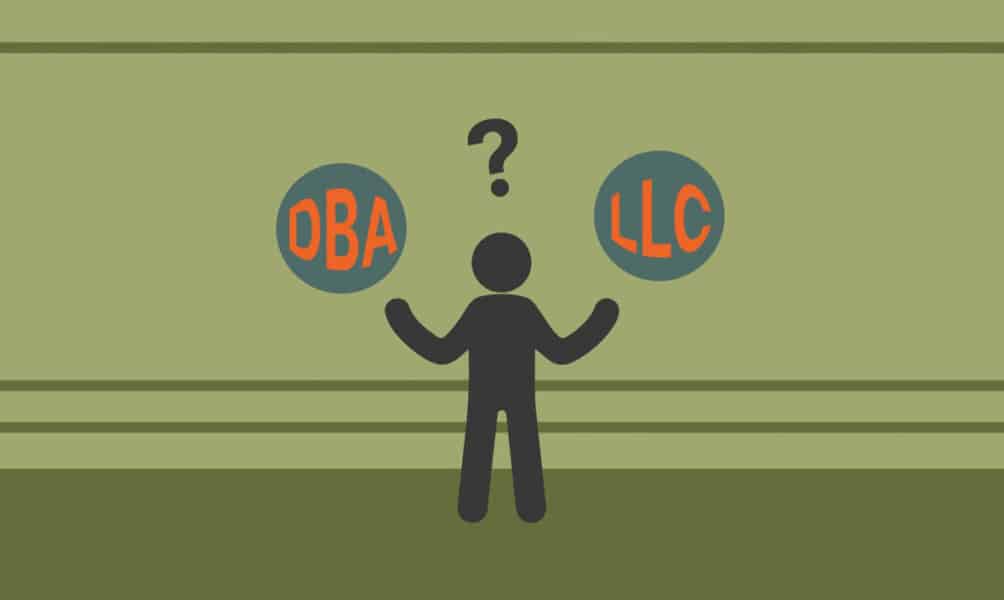If you’re starting an LLC, the business entity formation process is one of the first and most important hurdles. This step can be terribly complex ...
Difference Between DBA and LLC
Written by: Esther Strauss
Esther is a business strategist with over 20 years of experience as an entrepreneur, executive, educator, and management advisor.
Edited by: David Lepeska
David has been writing and learning about business, finance and globalization for a quarter-century, starting with a small New York consulting firm in the 1990s.
Published on October 7, 2021

If you’re starting a business, you may have heard about limited liability companies (LLCs) and doing business as (DBA) registrations, which are two very different things. One is an official type of business entity, while the other is merely a cosmetic name change.
Here is a quick look at how DBAs differ from LLCs.
| Criteria | DBA | LLC |
|---|---|---|
| Definition | A fictitious name under which a business operates, different from its legal name. | A legal business structure that separates personal and business liabilities. |
| Registration | Generally registered with the local county clerk's office or state agency. | Formed by filing Articles of Organization with the state's Secretary of State. |
| Legal Protection | Provides no personal liability protection. Business debts are personal debts. | Provides personal liability protection. Business debts are not personal debts. |
| Taxation | Taxes are filed under the owner's personal tax return. | Can choose to be taxed as a sole proprietorship, partnership, S-Corporation, or C-Corporation. |
| Ownership | Sole proprietor or partnerships can operate under a DBA. | Can be owned by one or more individuals or entities. |
| Name Ownership | The DBA doesn't give legal ownership or exclusive rights to the business name. | The LLC name is registered and protected in the state of operation. |
| Management | Managed by the owner or partners. | Can be member-managed or manager-managed as defined in the operating agreement. |
| Cost | Generally cheaper to register and maintain than an LLC. | More expensive due to state filing fees and potential ongoing fees. |
| Suitability | Suitable for small, local businesses with low liability risk. | Ideal for businesses with higher liability risk, multiple owners, or substantial assets. |
The Basics of LLCs
An LLC is an increasingly popular business structure for startups, offering liability protection for ownership and greater flexibility than a corporation, particularly in terms of taxes. The LLC itself does not pay taxes. As a “pass-through” entity, income passes through the business to the owner or owners, who report it on their personal tax returns. An LLC is created by filing paperwork with your state, and nominal fees are involved.
An LLC offers its owner or owners, who are called members, considerable flexibility in terms of management. You can choose your management and operational structure and decide how you want to be taxed. Your LLC can have a single member or multiple members, all of whom have personal liability protection, meaning your personal assets are not at risk if you cannot pay business debts or are involved in a lawsuit.
The Basics of DBAs
A DBA, or “doing business as”, is not a business entity. Simply put, it’s a name registered for a company to do business under that is not its legal business name. For example, you might have an LLC called “Smith Enterprises”, but have a DBA that allows you to do business as “Smith’s T-Shirts”.
Also, a DBA provides no legal structure and has no impact on taxes. It’s simply a registered name for the business. If you have a sole proprietorship or a partnership, you must operate under your personal name unless you register a DBA.
A DBA name is also sometimes called a fictitious name or a trade name. In some cases, businesses use the DBA name for banking or branding purposes. Don’t make the mistake of assuming a DBA will serve as a business structure that protects personal assets against creditors.
How to Choose Between a DBA and an LLC
If you have a sole proprietorship and decide to register a DBA, it will not suddenly protect you from business liability, the way an LLC would. It would only enable you to do business under another name.
If you have an LLC, on the other hand, your personal assets are already protected, and you can create DBAs as you wish, with no impact on your legal structure or tax status.
If your business has inherent risk or is profitable, you could be targeted by unscrupulous individuals. Thus, it’s wise to create a formal entity for your business in the form of an LLC.
Tax Implications of LLCs and DBAs
If you were to create a sole proprietorship and use a DBA, the taxes would be the same as those for an LLC with has a single owner. In both cases, income passes through the business to the owner, who pays taxes at her personal tax rate.
The downside to DBAs compared to LLCs in terms of taxation is the lack of flexibility. LLCs enable their owners to save money by choosing how to be taxed. An LLC can be taxed as a:
- Corporation
- S corporation
- Partnership
- Sole proprietor
The key takeaway in the context of taxation is it will be quite easy to file taxes whether you choose a DBA or an LLC. So don’t let potential tax issues be the primary determinant of your decision.
Filing Fee Differences Between DBAs and LLCs
DBAs are not as expensive or as complicated to create as LLCs. However, LLCs are quicker, easier and cheaper to form compared to corporations, and forming one is nothing to fear.
Initial LLC filing fees range from $40 to $500, and there’s also an annual fee that usually runs about $100. When you create a DBA, you need to pay a one-time fee, which varies depending on the state. However, adding another owner to the DBA name will also trigger another fee.
Also, some cities mandate that a notice of intent gets published in the local newspaper with every DBA registration, so everyone in the area is aware of your intention to use the name. This also carries costs.
Some states allow business owners to use the DBA for as long as desired without re-registering, while other states require filing every year, with annual fees.
If you’re like most entrepreneurs, you don’t have much free time. But of course if you hire an attorney to help you file your DBA or LLC, the cost will increase even more.
But it’s easy to file your own DBA or LLC without the costly assistance of a lawyer. You just need to do the research and invest some additional time filling out paperwork.
LLC and DBA Reporting Requirements
DBAs require a fee payment to re-register the name, but beyond that, there are no additional responsibilities.
LLCs, meanwhile, generally have an operating agreement that breaks down owner responsibilities and how the company will do business. The LLC operating agreement pertains to the details of the company’s officers, managers and members. Certain states mandate the LLC report updates to business locations every couple of years or even once each year. This requirement also extends to the company’s activities within the state.
Any alterations to the company’s management structure or members must be brought to the attention of the state. However, each state has its own rules so be sure to research your state’s requirements in terms of reporting and notifications.
Finally, LLCs must also name a registered agent who is responsible for receiving documents from the state, such as a summons or annual report notice.
Using DBAs Within an LLC
Plenty of partnerships and sole proprietors create DBAs for banking and privacy purposes. Most such entities eventually evolve into a more formal business structure, such as a corporation or LLC, which provides legal protection of the owner’s hard-earned assets.
Many LLCs have much to gain from using a DBA. LLC owners and managers looking to expanding operations to include new services or product lines often file a DBA, such as “Smith Enterprises”, mentioned above.
The creation of such a DBA still allows for the same important legal protection provided by the original LLC. In such an example, the DBA stretches out the LLC’s value offering yet does not mandate that the business owner create a completely new LLC for the new division.
Are There Any Merits to DBAs?
DBAs are not a formal legal entity or an official business structure. A DBA allows your business to use another name, but it may not even provide exclusive rights to that DBA name. Some states, unfortunately, have rules in place that empower other businesses to file the same DBA name and receive approval.
This helps explain why DBAs are not held in high regard by business attorneys, as they fail to safeguard not only personal assets, but even the registered DBA name itself! So why would you register a DBA for your business?
Though DBAs do not provide the same level of liability protection as LLCs, there are valid reasons for creating a DBA. If you hit on the right DBA for your business, it just might prove so appealing to consumers that it elevates your company to the next level, steering waves of new business in your direction.
The DBA is also favorable as it empowers a sole proprietorship to do business under a name that is not that of the business owner. This in turn enables the owner to open a bank account under the DBA name, and accept payments to that DBA name. This lends the business more credibility and it keeps the owner’s personal and business finances separate for accounting purposes.
Another benefit is that a sole proprietor can use DBA names to grow and diversify, so “Smith Enterprises” can also do business as “Smith’s Shoes”, “Smith Computers” and “Smith Travel”. Suddenly you’ve overseeing an empire.
The DBA allows for this naming diversity yet does not mandate the creation of a completely new and separate overarching legal entity. If your corporation or LLC has distinct brands or several business lines, it’s a good idea to opt for a DBA and not use the same name over and over again for each product line.
Subscribe to Our Newsletter
and gain insider access to cutting-edge business insights and trends.
Featured Resources

10 Best LLC Formation Services
Published on August 22, 2022
Read Now

How to Check if a Business Name is Taken
Published on January 24, 2022
Choosing a name for your business is an important step in starting your company. It’s the first impression that people will have of your companyan ...
Read Now

Can You Have Multiple Businesses Under One LLC?
Published on November 11, 2021
As an entrepreneur, you probably have a number of business ideas. If you’ve started one business and want to diversify into another, you shouldcon ...
Read Now
Comments